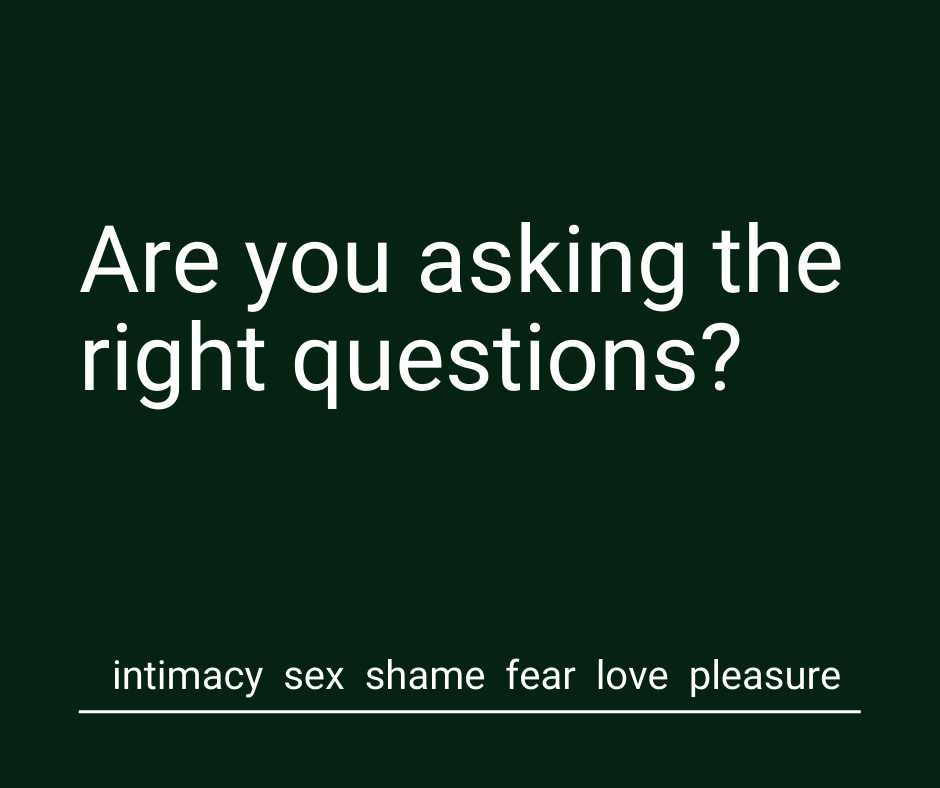Are you Asking the Right Questions for Good Intimacy?
/“Thanks for letting me be frank.”
“It was a very insightful process for me.”
“This has been a fascinating survey. Thank you for asking such provocative questions!”
For a few months in 2021, I conducted an online “Sex & Vulnerability” survey. There were 9 open-ended questions about personal intimacy topics, so participants could write about their feelings, experiences, and struggles in their own words. I’m working on analyzing the themes from the results now.
After also gathering demographic data (e.g., gender identity, sexual orientation, etc.) I ended the survey with space for participants to write any final thoughts:
“If you have any additional comments you’d like to share about your experience with this survey, please do so here.”
Of 269 respondents, more than 75 wrote something in response to this final question. The majority of responses thanked me for writing the survey questions and thanked me for the experience of being able to reflect on personal questions like this.
I was thrilled! I really appreciated that each individual gave me 5 to 20 minutes of their time for the survey, and I hoped that they would find value from the experience. But I wasn’t sure until I read so many responses like the following:
“The questions have made me think a little deeper about my sexuality.”
“Thank you for making this available for us to be able to put pen to paper so to speak.”
“Thank you! It is important to be able to express these thoughts, even if there is no immediate feedback.”
“Thank you for doing this. I felt empowered even in just answering these questions honestly. That itself contributes to enlightenment which is always a good thing! :-)”
Many of us don’t get to talk about such deeply personal and important topics like this in a thoughtful (and anonymous) way. This short response expressed this sentiment most poignantly:
“Thank you for asking.”
Why am I posting this as a new year’s blog? Because oftentimes, the questions that aren’t being asked are the most important questions to reflect on. They can give us insights that make a difference in how we move forward in communication and relationships. And the start of a new year is a helpful time marker to pause and ask new questions. For example:
“I really enjoyed the survey. Putting my feelings and struggles into words was a helpful exercise for me to be clear and concise the next time I'm intimate with a partner.”
“It caused me to think and focus what the truth is about me and how best to communicate it.”
“Thank you for this! This was such a nice activity and reflection to see where I'm at sexually and where I might want to change things up.”
“Thank you for this!! These were great questions for me and my partner to work through.”
And like one participant shared:
“I think more open and honest communication about sex makes the world a better place. Sex, on one level or another, is a part of all of our lives, but there's still a lot of discomfort when discussing it, so I applaud anyone who is willing to talk about it more!”
Below are the 9 survey questions in case you would like to take these questions on as a journaling activity or to prompt new conversations with your partner.
Happy 2022…and be kind to yourself.
Sex & Vulnerability Survey Questions
1. Is there anything sexual that you enjoy that you think is unusual or different than how others experience pleasure? If yes, what is that thing? (If no, but you still want to answer in some way, please do!)
2. Is there anything about sex or intimacy that you feel insecure about? If so, what are you most insecure about, and why do you think that is?
3. Do you have any difficulty expressing your emotions as related to sexual topics or sexual activity? If yes, what is difficult and why do you think that is?
4. Have you ever felt sexual shame? If yes, what were the circumstances? Do you still feel it now? (If not, how did you overcome it?)
5. Is there anything you avoid sexually? If yes, what and why?
6. Is there anything you are afraid of a sexual partner thinking or knowing about you? If yes, what?
7. How often do you feel fully present during a sexual encounter? Always, Mostly, Sometimes, Rarely, Never? If mostly, sometimes, rarely, or never, what distracts you?
8. If you could snap your fingers and change one thing about your sexual functioning or sexual expression, what would it be?
9. What do you appreciate or love about your sexuality, sexual functioning, or sexual expression?
~Dr. Jenn Gunsaullus — San Diego Sex Speaker, Intimacy Coach, & Sociologist










































